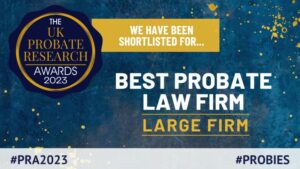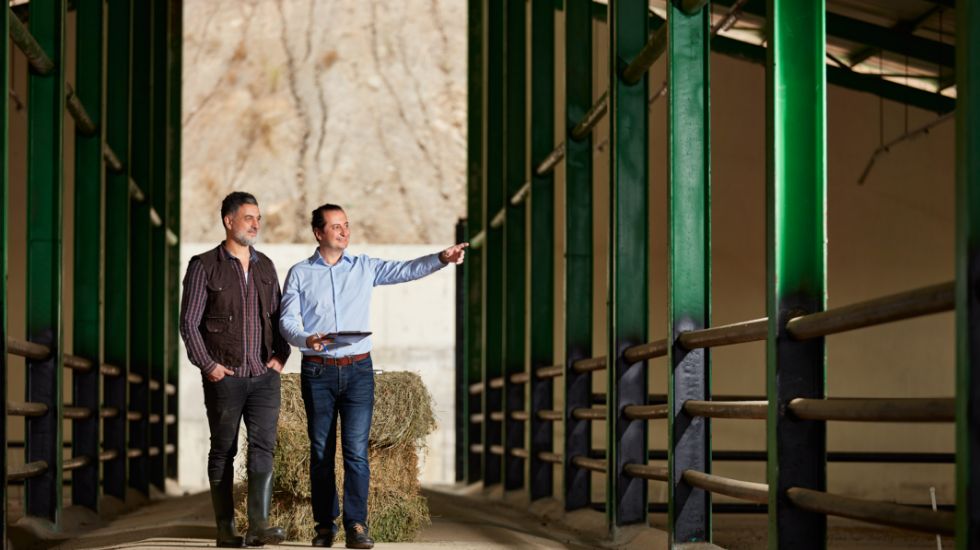Jump to section
How we can help
Let our highly experienced Probate and Will, Trust & Estate Disputes teams help minimise the stress for you at a difficult time. We offer a wide range of options, depending on how much support you need.
As one of the largest teams of probate and contentious probate lawyers in Kent and the South East, we have a vast depth and breadth of experience and combine sensitivity with a practical approach to dealing with even the most complicated of issues. Our award winning team specialises in administering complex, high and ultra-high net worth estates, as well as estates with agricultural and business assets.
If problems arise, our highly regarded Will, Trust & Estate Disputes lawyers help resolve issues as quickly and cost effectively as possible. We can also draw on expertise from our Wills, Estate & Tax Planning, Tax Management and Residential Property & Conveyancing teams as needed.
Our probate experts also have a great deal of experience in working on international estates and the complexities involved here and have a trusted network of overseas lawyers we work with regularly.
We also have specific expertise in dealing with unusual assets and holding structures. In addition, our team can assist with heritage assets and reliefs, conditional exemption and offers in lieu of tax.
Efficient, effective, friendly and helpful.
We understand what it means to lose someone and that each estate is unique. This is why we offer a bespoke service, delivering support tailored to your individual needs at this difficult time.
- Full estate administration: We will deal with each aspect of the probate process, so you are not burdened with the responsibility
- Executor support service: You choose which parts of the process you want to carry out yourself and which parts you would like to hand over to our probate experts
- Grant-only service: We apply for the Grant of Representation on your behalf, enabling you to do the rest of the work yourself
- Independent Administration: A service for estates where those involved in administering an estate feel that they can go no further with the process and require an Independent Administrator to be appointed to resolve the issue.
Our probate questionnaire can help identify the type of help you may need.
Accreditations & awards




Accreditations & awards



The probate process, timeframes and costs
Probate is the process involved in dealing with the property, money and possessions of a person who has died. Depending on the nature of the assets involved, it can be very complicated.
We have extensive experience of handling high net worth estates involving complex tax issues. Many of the estates we administer include multi-jurisdictional assets and farms or business interests.
Our team takes a very proactive approach to dealing with the Probate Registry and HMRC and always endeavours to complete the probate process as swiftly as possible.
How does the probate process work?
Probate is the process involved in dealing with the property, money and possessions of a person who has died. The probate process is different depending on whether or not the deceased person had a will. The first step is to ascertain the assets and liabilities of the estate, complete any Inheritance Tax (IHT) returns and then obtain the grant (commonly referred to as the grant of probate where there is a will), which confirms that the personal representatives (the named individuals appointed by the deceased in their will to deal with the estate) have the authority to administer the estate of the deceased and can therefore access their bank accounts, sell assets and settle any debts. If the deceased did not have a will, then a grant of letters of administration is applied for instead and acts in much the same way as a grant of probate.
After obtaining the grant the assets – such as property or investments – can then be collected in and any debts paid. Once it is clear that there are no other claims against the estate, the personal representatives can consider making distributions to the beneficiaries, but they also need to deal with matters such as outstanding tax returns. Once all that is done, and any necessary clearances have been obtained from HMRC, the final distributions can be made as per the terms of the will (if there was one) or in line with the rules of intestacy.
If there is IHT to pay, this is due to HMRC six months after the end of the month of death. After that, interest is payable on any outstanding IHT. It is possible to pay IHT Tax on certain types of assets, such as land and some business assets, in 10 equal annual instalments (or until the asset is sold, if sooner). This can help with cash flow if an estate is made up of largely illiquid assets although HMRC charges interest currently at 7.75% on outstanding IHT.
How long does the probate and estate administration process take?
On average, estates can take up to 9 – 24 months to administer, depending on whether there are any HMRC enquiries into the Inheritance Tax Account, and assuming third parties provide relevant information promptly. The first step is to obtain the grant of representation (commonly referred to as probate), which confirms that the personal representatives have the authority to administer the estate of the deceased.
Typically, obtaining the grant of probate can takes up to 9 months from when we are instructed; collecting assets then follows and can take a minimum of 6 – 8 weeks, if straightforward. If a property needs to be sold, it will take much longer as a purchaser must be found, and the conveyancing transaction needs to complete.
HMRC clearances then have to be obtained which may take at least 3 – 4 months, after which the estate can be distributed. The distribution is dependent on advice concerning claims which could be brought against the estate, which might alter the date upon which the executors can distribute the estate.
How does any Inheritance Tax get paid?
If there is Inheritance Tax (IHT) to pay, this is due to HMRC six months after the end of the month of death. After that, interest is payable on any outstanding IHT. It is possible to pay IHT Tax on certain types of assets, such as land and some business assets, in 10 equal annual instalments (or until the asset is sold, if sooner). This can help with cash flow if an estate is made up of largely illiquid assets.
Everyone has been extremely supportive throughout all the stages.
How much does probate cost?
We always tailor our services to your specific needs and unique situation. To determine how much the cost is likely to be, we first of all assess with you the type of service you want and need.
We will take time to understand how much help you would like and the nature of the estate involved, including the complexity of the will, assets and liabilities of the estate. We then calculate the number of hours we believe your matter will take and provide you with a best estimate, both in terms of the work up to obtaining the grant of probate stage and for the post grant work.
If it is unclear at the outset what will be involved, we will work on hourly rates until we can make a full assessment of the matter and then provide you with a cost estimate.
We understand what it means to lose someone, and the support and sensitivity which is needed when it comes to the probate process.
Dealing with an estate can vary enormously, so ensuring that you get the right type of support and probate advice is vital in making the process easier to manage. The process depends on the complexity of the will, the type and quantity of assets in the estate and how much work you want to do or have time to do yourself.
If you are dealing with probate you will need to assess the intricacy of the estate, your role in administering it and the type of support you need. We have helped generations of executors understand and navigate the process with our team’s expert probate advice.
We offer three types of services:
- A Grant only service on a fixed fee basis
- Executor support service where you choose which parts of the process you want to do yourself
- Full estate administration service.
Grant-only services are provided on a fixed fee basis and will involve us drafting the probate papers from the information that we receive from you. The fixed fee excludes any investigative work by us which we will be pleased to assist with, and this work would involve an additional charge. VAT is charged at the current rate of 20%*.
- Excepted estates – our normal charge for obtaining a Grant is £2,000 plus VAT at 20%, the probate court fee of £273 plus £1.50 per copy
- Non-taxable estate – our normal charge for obtaining a Grant in a non-excepted estate where no Inheritance Tax (IHT) is payable and an IHT400 is required is £4,000 plus VAT at 20%, the probate court fee of £273 plus £1.50 per copy
- Taxable estate – our normal charge for obtaining a Grant in a taxable estate requiring an IHT400 is £5,500 plus VAT at 20%, the probate court fee of £273 plus £1.50 per copy
- Probate resealing – our normal charge for resealing the grant of probate of a Commonwealth resident is £2,250 plus VAT at 20%, the probate court fee of £273 plus £1.50 per copy
- Estates of non-domiciled persons – our normal charge for obtaining a Grant to the estate of a non-domiciled person where an IHT400 is required is £4,500 plus VAT at 20%. the probate court fee of £273 plus £1.50 per copy.
The fixed fees assume that the personal representatives are able to provide full information in the Grant-only probate questionnaire together with all relevant documentation referred to in the above links, and that there is no requirement to undertake further investigation of the deceased’s estate.
In some cases, the replies given in the questionnaire may necessitate investigative work for which an additional charge on a time spent basis will be made, which will be calculated by reference to our hourly rates.
Our hourly charge out rates
The charge out rates for our lawyers vary between £185 to £445 per hour plus VAT at 20%, depending on their experience and seniority. Our rates are reviewed in June of each year.
How long does a grant only probate service take?
For an excepted estate using our grant only service, once we have been given all of the information the time period to extract the grant is currently between 6 – 8 weeks.
For taxable and non taxable estates once we have been given all of the information the time period to obtain the grant is between 8 – 16 weeks, but it can be much longer if a paper rather than digital application needs to be made (for example, when there is no will.)
These time periods are not precise and should not be relied upon as we are reliant on HMRC and the Probate Registry. At present we are experiencing long delays with the issuing of grants, which is beyond our control.
What does a full estate administration service include and cost?
Probate costs can be difficult to estimate and will depend on the complexity of the estate and time spent on each task. At the outset, we will provide our best estimate of our costs, which will be based on our hourly rates and from the information we have. If, at any point, we are asked to do additional work (for example additional assets come to light or HMRC opens an enquiry into the Inheritance Tax account) our costs will increase.
Typically, for example, for a non-taxable estate, if there is one beneficiary, no property and the estate includes 5 – 6 straightforward assets such as a bank account, National Savings, 2 small shareholdings, life policy and a few low value personal chattels, costs may range from between £10,000 to £15,000 plus VAT at 20%.
If there are multiple beneficiaries, a property and multiple bank accounts and investments and the estate is taxable, but otherwise straight forward, costs may range from between £25,000 – £35,000 plus VAT at 20%.
The ranges illustrated, in some cases, may be higher due to the nature of the assets to be dealt with or negotiations with HMRC, time delays caused by third parties or because of the relationship between family members. The ranges given do not allow for any tax planning, conveyancing work, disputes or collection of overseas assets requiring separate grants, nor estates requiring consideration of any trusts under a will.
Probate costs are likely to be higher for more complex estates including:
- Agricultural/business property
- Complex investment structures and valuations
- Estates where numerous lifetime gifts have been made
- Complex IHT calculations
- International assets requiring separate grants
- Estates including a contentious element and where we may be acting as an Independent Administrator
- Intestacies
- Estates of a non-domiciled person
- Cases where HMRC – IHT have made an enquiry
- A bespoke fee estimate for more complex cases will be given once all relevant information is known.
We are not able to estimate costs for IHT enquiries and disputes. These areas will increase costs and lengthen the time that it takes to complete the estate administration but we can update you regularly on costs.
We can offer additional services, such as after death tax planning (e.g. deeds of variation), planning estate disposals for CGT purposes, conveyancing for the estate property, advice on trusts contained within wills including trust management and also wills for the beneficiaries.
What additional probate fees and disbursements will arise?
Disbursements are expenses payable to third parties, like those listed below. Not all may be applicable.
• Probate Registry fee – currently £273 plus £1.50 for each copy of the grant
• Unknown assets search fees – £185 plus VAT at 20%
• Statutory Advertisements – in the region of £250 – these protect the personal representatives against unexpected claims from unknown creditors
• Land Registry fees – minimum of £3 plus VAT at 20%.
Probate questionnaire
If you are interested in finding out more about how we can help or would like an initial quote for our services, please fill in our probate questionnaire.
Dying without a will – intestacy
Intestacy means dying without having made a valid will. In England & Wales the intestacy rules set out who inherits the estate if this happens. Contrary to what many believe, in these circumstances an estate cannot just be divided how the family wishes or how the family feels the deceased would have wanted – instead the intestacy rules apply.
These rules do not include unmarried partners or step children. In fact, the intestacy provisions not only mean your assets may not pass to those you wish to receive them, they can also potentially be Inheritance Tax (IHT) inefficient.
This is one of the reasons why it is very important to make a will, which is something our Wills, Estate & Tax Planning team can help with.
How does the probate process work if there is no will?
When someone dies intestate (i.e. without a valid will), they have not appointed executors to deal with their estate. As a result, someone will need to apply for a grant (known as a grant of letters of administration as opposed to probate). This will allow them to administer the estate in line with the intestacy rules. There is a set list of people who can apply for the grant, depending on which family members are living. It starts with the spouse, and then moves down to children (if they are over 18), parents, brothers and sisters and so on. Determining who is entitled to act can be complex if the person who died did not have any close living relatives. If someone believes they are entitled to act as administrator, they should investigate the family tree thoroughly. They could employ the services of a genealogist to help with this, and the genealogist may be able to trace any relatives who may have lost touch with the deceased. It is possible that more than one family member is entitled to act as administrator. If this happens, they can either act together (up to a maximum of four people), or one may take on the role on behalf of the others. There is always the risk of disagreement between those entitled.
Who inherits under the rules of intestacy if there is no will?
It depends on the living relatives of the deceased. If there is a surviving spouse (which includes a civil partner in this note), and no children, the spouse will inherit the entire estate.
If there is a surviving spouse and children, the spouse will receive the first £322,000 together with the personal possessions. Any remaining estate is divided so that the spouse receives 50% and the children receive the remaining 50% equally between them.
If there are children but no surviving spouse, the children inherit the entire estate in equal shares. If any children have predeceased, their children (i.e. the deceased’s grandchildren) will inherit their share of the estate.
If there is no surviving spouse and no children then the estate moves along the family tree to parents, grandparents, brother and sisters, nieces and nephews, aunts, uncles and cousins.
If the entire list of family members set out by law is exhausted then the estate will pass to the Crown. This is known as bona vacantia.
I would like to thank you so much for the helpful and sensitive manner in which you have handled this for me.
Can intestacy rules be challenged?
Yes, certain categories of people can make a claim against the estate if they feel they have not been adequately provided for. This is a claim under the Inheritance (Provision for Family and Dependants) Act 1975. Those who can make a claim include a spouse or civil partner, a child, someone who was treated as a child of the deceased (e.g. step-children) and someone who immediately before death was being maintained either wholly or partly by the deceased. This could include a long term partner.
What happens if members of the family all die at the same time without leaving wills?
In this situation, the order of death has to be determined. If the order of deaths is unknown the law states that the eldest person is deemed to have died first. Each estate is then looked at separately taking into account the order of deaths to determine who will inherit under the intestacy rules.
For example, a father, mother and child all die in an accident. The father is eldest and is deemed to have died first, then the mother and finally the child. Taking the father’s estate first, he left a surviving spouse but as she failed to survive for 28 days she is deemed to have died before him. He left a child but they failed to reach 18 they don’t benefit from the estate. Therefore the wider family tree is investigated as set out above. Then the mother’s estate and finally the child’s estate would be investigated in the same way.
International estates
Our expert probate lawyers specialise in estate administration for non-domicilied individuals and those with international assets.
We have strong links with a wide range of legal experts in a range of jurisdictions, including the US, Spain and Poland.
What happens when someone who doesn’t live in the UK dies with assets in England?
When someone who lives outside the UK dies leaving assets in England, a grant of representation to their estate may be obtained overseas (although not all jurisdictions work this way). If there is a foreign grant of representation, it is unlikely to be recognised in England. In such cases an application to the English Court for a grant will be required.
Generally, if the foreign grant of representation was issued in a Commonwealth country, it is possible to have this resealed at a Probate Registry in England.
This process is relatively straightforward although the usual IHT reporting will need to be made before applying for the grant of representation. An official and court sealed copy of the grant of representation and will (if applicable) will need to be presented with the application for reseal.
The resealed grant should be sufficient authority to deal with the English asset(s). If we need to deal with the post grant work for a resealed grant, then this can be arranged by signing a power of attorney authorising us to administer the English estate.
If a foreign grant was issued outside of the Commonwealth, it will not be possible to reseal the foreign grant and a full grant application will need to be made to the Probate Registry in England & Wales.
These applications can be complicated and the Court will need to be satisfied of the domicile position of the deceased, and the entitlement to administer the estate, before issuing the grant of representation. Again, the usual IHT reporting needs to be made.
Who is entitled to make such an application will be dependent on the circumstances of each individual estate and we would invite you to get in touch should you need to make such an application.
As mentioned above, in order to obtain any of grant of representation in England, an inheritance tax return will need to be submitted. This is regardless of whether there is inheritance tax to pay.
How do I reseal probate in the UK?
Resealed grants are issued by the Probate Registry in England & Wales.
In order to obtain a resealed grant, the estate will need to complete the required Inheritance Tax reporting and pay the Inheritance Tax due (if any) The inheritance tax reporting and tax payable depends upon the value and nature of the deceased’s taxable estate at the date of death.
An official copy of the grant certified by the issuing court in the foreign jurisdiction will need to be provided alongside a similarly certified copy Will (if there is one) in order to obtain a grant. The personal representatives also need to supply the appropriate authority for a resealed grant to be issued.
Our expert team of lawyers are experienced in making such applications and can guide you through the process.
What is domicile?
Domicile is a different concept to residence or nationality. It has tax consequences, but can also affect how land and buildings in England & Wales pass on death. A non-domiciled person is someone whose domicile is in a country or territory outside England & Wales (such as France, a canton of Switzerland or a state in the US). Being non-UK domiciled can be beneficial for inheritance tax (IHT) purposes. For IHT purposes, you can be resident outside England & Wales, but still be domiciled here in certain circumstances. The law surrounding domicile is highly complex.
Do you have to pay Inheritance Tax on UK assets if you are not domiciled here?
The worldwide estate of a UK domiciled individual is subject to IHT at a rate of 40% over and above the available nil rate band. However only the UK estate of a non-domiciled individual is subject to inheritance tax. With UK IHT being one of the highest rates of tax in the world, a non-domicile status certainly can assist with tax planning opportunities.
UK domiciled clients with worldwide assets can often become subject to tax in both the UK and the foreign jurisdiction in which the assets are held. The personal representatives would need to consider relevant treaties or reliefs to limit the double taxation burden. These reliefs and treaties are generally only applicable when the foreign jurisdiction has also imposed a tax similar to UK IHT which many jurisdictions do not.
IHT for non-domiciled taxpayers is a very complicated area of law but generally if you are domiciled outside the UK (and not caught by the deemed domicile rules for IHT), only your UK assets would be subject to IHT on your death. If you believe you are not domiciled in the UK you should take specialist advice to review this.
What is the difference between domicile and residence?
Residence is generally where you live. As international travel has become commonplace, most countries have a test to determine whether you are resident there, based mainly on where you spend most of your time. In the UK, this is the Statutory Residence Test, and it takes into account other factors as well as simply time. If you are resident in more than one country based on their residence tests, you will need to look at double tax treaties to see if they help to determine your status (and to avoid possible double taxation).
There are three types of domicile that a person can have, and every person must have a domicile but no more than one at any time. The first is the domicile of origin, which revives throughout life in the absence of any other domicile. This is the domicile acquired at birth (based on your father’s domicile if your parents were married when you were born). It can change while you are a child, if your father’s domicile changes. In this case, it becomes a domicile of dependency. Women who married before 1974 also acquired a domicile of dependency from their husband.
Once adult, your domicile of origin (or dependency depending on the circumstances) continues to apply unless and until it is replaced by a different domicile of choice. To acquire a domicile of choice requires living in a country with the intention of remaining there permanently or indefinitely. The assessment of intention gives rise to much debate with HMRC, who take into account a wide range of factors including the length of time spent in a country, the ties in that country, the reason for being there, plans to leave, ties with other countries, family and work circumstances and many others. It is not easy to assert an overseas domicile after living and working in the UK for many years, in the absence of compelling evidence.
In addition to the concept of domicile at general law, there are particular rules that apply to domicile for tax purposes (such as becoming “deemed” domiciled in the UK for IHT purposes after being resident here for 15 years out of the preceding 20 years).
It is possible to be a non-UK domiciled individual for IHT purposes but a UK resident for income tax and CGT and vice versa.
How do I lose my domicile status?
Losing a domicile and acquiring a new domicile of choice (or reviving a domicile of origin) requires a complete abandonment of the previous domicile. For example, if a UK domiciled taxpayer disposed of all their assets in the UK and moved to Germany with the intention of spending the rest of their life there (and demonstrated this by acquiring a home and forming ties there), they could acquire a domicile of choice in Germany. To determine this it would be necessary to see evidence that they were basing their life there. However, even if the taxpayer was able to demonstrate the necessary intention, there are UK tax rules that could determine how effective that departure is for tax purposes. For Inheritance Tax, if the taxpayer was resident in the UK for 15 of the last 20 tax years immediately before an Inheritance Tax charge arises, they will still be treated as being domiciled here for IHT purposes.
Usually a number of years of non-residence (often six clear and complete tax years) will ‘shake off’ the deemed domicile rules for IHT but you should obtain legal advice specific to your circumstances.
Why would a grant be resealed?
Foreign grants of representation are not usually recognised by English companies or the Land Registry. Therefore, in order to deal with English assets, a resealed grant will be required (if the foreign grant was issued in a Commonwealth country) or otherwise a full grant of representation issued in England & Wales would need to be provided (if the grant was issued outside of the Commonwealth).
Whether a grant needs to be resealed depends upon the type of asset held in England and the entity which will register the transfer. For example, individual banks have differing requirements on releasing funds without sight of a valid grant of representation. NS&I, one of the UK’s largest financial institutions, has a threshold of £5,000 before insisting on a resealed grant. If property (real estate) is owned in England, then the Land Registry would need to see a grant of representation.
It is not the will which is resealed, it is the grant issued by the Commonwealth country. It is entirely possible to reseal a grant of letters of administration (or similar) in the UK if the deceased did not leave a valid will.
Helen Stewart is approachable, intelligent, efficient and clear with her advice to her clients. She is always acting in their best interests and she doesn't hesitate to get involved in and help resolve complex matters. I wouldn't hesitate to recommend Helen to friends, colleagues and clients.
Agricultural estates
Combining sensitivity with a practical and straight forward approach, our probate lawyers have particular expertise in administering large landed and farming estates and in dealing with their unique complexities.
We understand what it means to lose someone and that each estate is unique, which is why we offer a bespoke service, delivering support tailored to your individual needs. Our team and the firm as a whole has a deep connection to the agricultural sector and has delivered peace of mind to generations of farming families.
If you are dealing with the estate of a landowner or farmer it is important to assess the intricacy of the estate and the type of support you need. Farmland and other agricultural assets, even possibly the farmhouse, may qualify for Agricultural Relief (AR). Our team can offer expert probate advice to help you understand and navigate the process of administering an agricultural estate and claiming the relevant reliefs. By working closely with our Wills, Estate & Tax Planning, Trust & Tax Management, Residential Property & Conveyancing and wider Agricultural teams, we have the depth and breadth of experience to advise on every aspect of probate and beyond to obtain the best result for the family.
What is Agricultural Relief?
Agricultural relief is a relief against Inheritance Tax (IHT) available on the agricultural value of agricultural property. Property includes land, buildings (including farmhouses, or other property occupied e.g. by farm workers), livestock and woodland. As from 6 April 2024, the relief applies only to property in the UK. Previously relief was also available on land in the Channel Islands, the Isle of Man and the European Economic Area .
The relief is available where the deceased was a sole trader or a partner in a farming partnership. Relief may also be available for the deceased’s shareholding in a farming company. However, care needs to be taken to identify who actually owns the land and who is in occupation. Thought also has to be given to other potential assets owned by the business.
How do you qualify for Agricultural Relief?
In order to qualify for the relief, there must be agricultural land or pasture which is occupied for agricultural purposes. Agricultural purposes is not defined but is generally understood to be for food production. Where there is qualifying land, the relief can extend to the woodlands and buildings that are associated with and ancillary to the farmland.
In order to qualify for the relief, the buildings must be of a “character appropriate” to the land.
The land will need to be owned for at least two years to qualify for the relief. If the land is owned but occupied by someone other than the owner for agricultural purposes then the land will need to be owned for seven years.
Do you pay Inheritance Tax (IHT) on farmland?
If the land is used for agricultural purposes and has been owned for the required period of time then the agricultural value of the land is relieved from Inheritance Tax. However, the market value of the farmland can be significantly different to the agricultural value, such as where the land has development potential. In these circumstances it may be possible to qualify for business relief in relation to the difference in value, and so avoid IHT on the full market value of the farmland.
You have been very patient with my queries and clear with your explanations along the way, and so easy to work with – it has been very much appreciated. Thank you.
Does a farmhouse qualify for Agriculture Relief from Inheritance Tax?
A farmhouse may qualify for relief provided it is of a character appropriate and is occupied by a farmer together with the adjoining farmland. This will be very fact specific as the extent of land farmed, the size of the farmhouse, the time spent farming and the locality of the farm will all be factors, alongside others, in considering if a farmhouse will qualify for relief. If the house does qualify for relief it will only be able to attract relief on the agricultural value of the house and not the full market value.
Are farm cottages eligible for relief from Inheritance Tax?
It is possible to claim agricultural relief on a farm cottage but it will depend on who occupies the cottage. If it is occupied by a farm worker it should qualify. If, for example, the cottage has been let on an assured shorthold tenancy, it won’t qualify for agricultural relief but may still attract business relief if taken with a number of factors the cottage only forms a small part of the overall farm business.
Is relief from Inheritance Tax available if not all assets of the farming business are used for agricultural purposes?
In many farm businesses diversification has taken place over a number of years in order to increase the profitability and income streams for the farm owner. This diversification may affect the availability of agricultural relief on the business as a whole. However, in some cases business relief may be applied instead.
How do you value a farm for Inheritance Tax?
In order to value the farm all aspects need to be considered, such as the land, the buildings and houses, and also the machinery, crops and livestock. If the land is farmed through a partnership or limited company then the partnership interest or shareholding will need to be valued taking into account the underlying asserts of the business. In valuing a farm it is sensible to work closely with a good agricultural surveyor and the farm accountant.
Digital assets
The digital world is becoming increasingly dominant in our modern life. What is clear is the distress caused to families and loved ones, if digital assets such as photos, music, videos, blogs, art, manuscripts, bank accounts and crypto currencies either cannot be accessed or are lost forever.
What is a digital asset?
Many people store photos, videos, music, e-books, blogs, movies, emails, conversations, social media, games, bank accounts, medical records, cryptocurrencies such as Bitcoin and even maintain their identity online. Collectively these are referred to as ‘digital assets’. These may be of a financial, sentimental, intellectual and social value to you, your family and friends.
Why are digital assets important?
It is important to plan for what happens to your digital assets when you die or if you lose mental capacity as they may have:-
- A financial value such as online bank accounts, online gaming accounts, crypto currencies, photograph sharing accounts, popular domain names and websites
- A sentimental value to your family and friends such as photos or emails that might be stored on a smart phone, on an online photo sharing website, in cloud storage or on social network account
- An intellectual value such as domain names, website content, blogs, copyrights and trademarks, art and manuscripts. These are difficult to value. Specialist advice is needed
- A social value such as social media and gaming accounts.
I would like to thank you so much for the helpful and sensitive manner in which you have handled this for me.
How should I organise my digital legacy?
It would be advisable to make an inventory of all digital assets, where to find them with usernames. Make sure these are updated when they change and insure that this list will pass to your personal representatives or attorney upon your death or incapacity. Take legal advice to ensure that what you decide is effective.
Are there any security issues around digital assets to be aware to be aware of on death?
You may have concerns around confidentiality regarding email and social media accounts which could reveal the existence of relationships or interests that were not widely known. It’s a good idea to consider in advance whether social media profiles should be memorialised or shut down.
If you are passing on login details, you need to consider issues around identity theft.
What digital assets can be gifted under a will?
You can leave your personal possessions under your will, but unless specified, that wouldn’t include digital assets. Personal possessions include devices such as a laptops or mobile phones but not necessary the data they contain.
In addition, ownership of a device does not necessarily mean ownership of all the rights associated with the information stored on it. For example, a gift of an iPhone with an active iTunes account, does not include the iTunes account. The music on iTunes is only a personal licence to use the music according to Apple’s terms of business. This license is not transferrable and terminates on death.
Post death variations
When someone benefits from a deceased person’s estate under a will or intestacy, or as the surviving owner of a jointly owned asset, they may wish to redirect the inheritance to others. There are considerable tax advantages if this type of gift is made by a qualifying deed of variation.
Our team works closely with our Wills, Estate & Tax Planning team to ensure that any estates that might benefit from a deed of variation are able to take advantage.
The service I have received has exceeded all my expectations. Sarah has not only been professional at all times, she has gone out of way to be helpful answering, even anticipating, my questions. She’s been a pleasure to deal with at times guiding me through a process that I would otherwise have struggled with.
Independent Administration
Independent Administration is a specialist service for estates where those involved in administering an estate feel that they can go no further with the process and require an independent administrator to be appointed to resolve the issue.
We have one of the largest Independent Administration teams in Kent, advising clients across London and the South East. Our lawyers have many years of experience dealing with complex estate administration.
Our Trust Corporation is regularly appointed by the Court as a completely neutral party, whose role is to act for the greater good of the estate, and ensure it can be administered, despite any ongoing issues between the original executors or beneficiaries. The appointment of an Independent Administrator ensures that the estate will be dealt with professionally, independently and efficiently and that any assets will be preserved.
As a full service law firm, our Independent Administrator team often works closely with colleagues in our Corporate and Commercial, Real Estate, Employment, Residential Property & Conveyancing, Tax & Estate Planning, Trust Management and Agricultural and Rural Property teams. Having such a wealth of expertise to call upon, we are able to deal with every aspect of even the most complex estates, to the highest standards.
We will always take a practical and common sense approach, to help resolve cases as quickly and cost effectively as possible, offering peace of mind to all involved in the estate.
What is Independent Administration?
It is becoming increasingly common for those involved in dealing with an estate to find themselves in a position where they cannot move forward with the estate administration. This can be for a wide variety of reasons. In such cases, an application can be made to the Court to appoint an Independent Administrator to help resolve any difficulties and overcome any deadlock.
How does Independent Administration work?
When a point has been reached where those involved in the estate – either as executors or beneficiaries – feel that matters cannot progress, they can apply to the Court to appoint an Independent Administrator.
This is best used for estates where the parties concerned cannot agree or are contesting the will, or where the executors have not acted at all or have acted improperly. By appointing an Independent Administrator, those involved in the estate can focus on resolving their issues, without placing the estate at risk in the meantime.
When is Independent Administration required?
There is a wide range of circumstances where an Independent Administrator may be appointed. These include both contentious and non-contentious situations.
For example:
Where there is a will and:
- The executor is considered unfit or inappropriate to act
- The executors are in dispute with each other
- The executor has renounced probate and no one else can be found to act
- The executor cannot be found
- The beneficiaries of the will are unhappy with the executor.
Where there is no will and:
- There are a number of beneficiaries who cannot agree.
What is the difference between an Independent Administrator and an executor?
An Independent Administrator is a person appointed by the Court to replace the executors appointed in the will, or those entitled under the rules of intestacy to administer an estate.
They will be completely unconnected to the estate and the parties involved, and will have no interest in the assets to be dealt with, so will be completely impartial.
What is the difference between contentious probate and Independent Administration?
The two often go hand in hand, however they are not the same. Independent Administration is a way for estate administration to move forward while any contentious probate disputes are resolved. For example where estate assets are at risk, bills connected to the estate need to be paid or rent owing to the estate still needs to be collected. An Independent Administrator can be appointed to handle these issues while the parties involved attempt to resolve their dispute.
An Independent Administrator can also be appointed in non-contentious situations, such as when the executors cannot be identified or cannot act for any reason.
Who can ask to appoint an Independent Administrator?
Anyone with an interest in the estate, such as a beneficiary or executor may apply for an Independent Administrator to be appointed, but the court will only agree to their appointment if there is good reason.
Is appointing an Independent Administrator expensive?
It is generally much more cost effective in the long run to appoint an Independent Administrator than to continue attempting to administer an estate which has stalled, especially when there are disputes between the executors and/or beneficiaries.
Who can be an Independent Administrator?
An Independent Administrator will usually be an experienced and specialist probate lawyer with the ability to handle even the most complex of estates. At Thomson Snell & Passmore, our Trust Corporation will be appointed to act, with one of our experienced probate lawyers dealing with the estate administration work.
Paul Hill was excellent, very professional, knowledgeable and explained everything I needed to know in layman’s terms. Throughout probate, Paul’s advice was essential in ensuring all legal requirements were covered and also maximising the inheritance value. Having to deal with losing a loved one is difficult enough, Paul made the process of Probate worry free. Paul’s communication was first class and his knowledge of all the legal requirements was excellent. Very pleased.
Will, Trust & Estate Disputes
Disputes over wills, trusts and estates can be particularly difficult for families to navigate. With an aging population, increased reliance on family wealth and alternative family structures, inheritance disputes are increasingly common. Sensitive and timely advice is required to avoid conflict wherever possible and to implement cost effective, pragmatic solutions.
Our Will, Trust & Estate Disputes team has experience acting for individuals, families, executors, and trustees in resolving a wide range of contentious estates, including those which are high net worth or complex. We have expertise in dealing with trusts and estates that involve rural property and those that have assets located in different countries or multiple jurisdictions, and we work very closely with our non-contentious colleagues in our wider Probate team, our Wills, Estate & Tax Planning team, and our Tax & Trust Management team.
We will always look to minimise litigation risk and resolve disputes using mediation or other Alternative Dispute Resolution (ADR) methods wherever possible. Where necessary, we have an extensive track record of success in the courts of England & Wales.
Our contentious probate lawyers can help with:
- Will disputes
- Trust disputes
- Inheritance (Provision for Family and Dependants) Act 1975 claims
- Disputes with Personal Representatives (Executors/Administrators) and Trustees.
Accreditations & awards





I have always found the team at Thomson Snell & Passmore to be excellent. Extremely responsive, helpful and forward-thinking in finding a course of action that works for you. Fairly priced and yet a level of service and knowledge far beyond that; Thomson Snell & Passmore in my opinion is beyond compare.
Will disputes
It can be a hugely emotional and challenging time when a close relative or friend dies. These difficult circumstances can be made all the more testing when, as is often the case, that person dies leaving no will (this is known as an “intestacy”), or they leave behind a will that arises suspicion, does not seem to reflect their true wishes, or is simply not as you would have anticipated.
If you find yourself in this situation, there are a number of potential routes and remedies that may be available to you. Although litigation can be a very effective means of resolving disputes, it is not always the case that you would need to go to Court, and with legal assistance these issues can often be resolved in an amicable and successful manner without recourse to formal proceedings.
We have extensive expertise in this area, and we will give you honest, practical advice about the merits of your case and how best to go about securing the outcome you want.
In addition, we work closely with our specialist Wills, Estate & Tax Planning team, and we advise on preventative measures that can be taken by clients to try to avoid such disputes.
What kind of will disputes can arise?
Disputes in relation to wills can arise for a variety of reasons:
- A will cannot be found
- You think the will you found is wrong
- You are not sure if the will is valid
- There are doubts about whether the person who made the will (testator) had the mental capacity to create such an important document
- There are doubts about whether the testator knew and approved the will
- There is a suspicion that others influenced the decisions of the person making the will
- There is a suspicion the will has been forged or planted after the testator’s death
- The will is unclear due to the will writer’s mistake or a clerical error.
Our expert will dispute lawyers can assist people in all of the above circumstances. We act for those wishing to contest a will and those wishing to prove that the will is valid (i.e. wishing to propound the will). We represent beneficiaries in disputes, and those who are named in the will as executors. We also act as independent administrators in cases where executors need to be removed and the estate administered by someone entirely separate from the beneficiaries.
When can you challenge a will?
A will may be challenged for a variety of reasons, for example there may be concerns as to its legal validity, whether a later will exists, the construction or interpretation of the will is unclear, or the terms of the will itself are defective.
While challenges to the legal validity of a will have no formal limitation period, claims are best pursued as soon as possible, and preferably before a grant of representation is made, as prospects can be severely reduced where distribution has already taken place.
Some claims carry very short deadlines (such as 6 months from the grant of representation) so it is best that specialist advice is taken. Alternative claims, such as those under the Inheritance (Provision for Family and Dependants) Act 1975 – which also have a 6 month deadline – may be pursued in conjunction.
How can you challenge a will?
Will challenges are generally pursued by application to the Chancery Division of the High Court, either to rule for or against a will’s validity, settle an issue relating to the interpretation of a will, or rectify a mistake contained in it.
Formal proceedings may be avoided where the relevant beneficiaries are in agreement, and not every application will be contentious (for example where there may be agreement, but the Court is required to consent on behalf of minors, unborn children or those lacking capacity).
You have been outstanding from start to finish in this process. You have been approachable patient, compassionate and professional in dealing with us from day one. We just wanted to thank you personally for all of this. We would have no hesitation in recommending your services to anyone or using them again in the future should we ever need to.
What can I do if I suspect a will is invalid?
Steps should be taken to investigate the position as a matter of priority, and legal advice on possible claims sought. A copy of the will and any previous testamentary documents will need to be obtained, however this may be resisted. It is likely that formal steps will need to be taken at an early opportunity to intervene in the administration and prevent the estate from being exhausted before the claim is resolved.
How much does it cost to challenge a will?
Claims involving disputed wills are necessarily fact specific and the costs differ greatly, depending on the complexity and volume of documentation, as well as the availability and quality of evidence needed. In some cases, expert witnesses (e.g. on testamentary capacity or on handwriting) may be required. In general, it is best to view costs on a phase-by-phase basis and bear in mind that compromise may be possible at any stage.
Initial advice
Advice will need to be sought at an early stage alongside gathering evidence. For example, in the case of claims involving testamentary capacity, medical notes are likely to form crucial evidence and it will generally be necessary to obtain notes from any relevant will drafter or witnesses.
Pre-Action correspondence
Parties will then engage in the exchange of information (usually by letter of claim and response) to narrow down the issues in dispute. This will help shape the prospects of the claim and whether any consensual outcomes are likely to be possible.
ADR
Once the issues in dispute are appropriately narrowed down, the parties might agree to engage in alternative dispute resolution in an attempt to avoid the costs, stress and delay of formal court proceedings. Most cases settle in this manner, without the claim being heard by a court.
If that is not possible, or the specific claim requires the determination of the court, then an application or claim will need to be issued. The costs will include disbursements (expenses) such as court fees and potentially the instruction of a barrister at certain points in the court timetable, as well as the possible need for expert witnesses.
Costs
In the case of will disputes, costs are at the discretion of the court. The usual rule is that the loser pays a contribution towards the winner’s costs, however there are many factors which a court can take into account and circumstances can arise, or be engineered, to give rise to different cost consequences (for example the placing of a settlement offer in an appropriate format). Advice should be taken in each case.
In some cases, we may be prepared to share or take on the costs risk with you. We can also explore 3rd party litigation funding with you, and insurance against the possibility of having to meet an opponent’s costs if the case is lost.
Trust disputes
A trust is a legal arrangement whereby one or more people (trustees) hold assets for the benefit of other people (beneficiaries). Those assets are often property or other investments.
A trust is created by the settlor who transfers his or her own assets to the trustees, specifying how and for whom those assets can be used and what powers the trustees have. A trust can be created during the settlor’s lifetime, but can also be set up in his/her will (in which case the “settlor” is known as the “testator”).
There are many different types of trust, e.g. bare trusts, interest in possession trusts, discretionary trusts, accumulation trusts, settlor-interested trusts and non-resident trusts.
The law can also deem that a trust exists, even where no trust document exists. For example, a constructive trust arises where someone buys property and holds that property in his/her sole name, but for someone else (e.g. someone who has contributed in some way).
Why do trust disputes occur?
Trust disputes arise in a number of contexts, not all of which are actively contentious, including:
- Breach of trust and removal of trustees
- Disputes about trustee powers and duties
- Claims against the validity of a trust, including mistake
- Disclosure of trust documents and accounts
- Applications to vary a trust or for directions of the court
- Disputes between trustees or with beneficiaries
- Third party claims or attacks upon the trust (for example upon the divorce of a beneficiary)
- Negligent legal or tax advice when the trust was set up.
Decisions on whether trustees should get involved in disputes and how they should pursue them carry potentially serious personal cost consequences for trustees. Our team has experience in dealing with disputes in all of the above circumstances and many more.
We also work closely with our specialist Wills, Estate & Tax Planning team, and with our Trust Management team, and advise on preventative measures that can be taken by clients to try to avoid trust disputes.
What are the grounds for contesting a trust?
There are many different circumstances in which a trust may be challenged. There may be a claim against the formal validity of the trust (for example the settlor lacked capacity or the trust was a sham trust) or perhaps challenges relating to the administration and distribution of the trust, including decisions taken by trustees about how they have exercised their discretion, claims for breach of trust, trustee removals and accounts.
They are a well balanced, top notch, collaborative team. Their skills complement each other and reflect their specialist areas.
What happens if trustees disagree?
Generally, trustees must act unanimously. If trustees cannot agree on a matter which involves exercising their discretion, then an application for directions from the Court may be appropriate. Where a trustee is unwilling to act, however, or the trust administration is jeopardised, it may be necessary to consider removal of a trustee or replacement/substitution.
What can I do if I don’t agree with the terms of a trust?
If there are concerns over the terms of a trust, there may be grounds for an application to the Court for:
- Construction of the document where the language is ambiguous or unclear
- Rectification where there may be an error in the terms of the trust
- An application to set aside the document on the grounds of mistake.
What can I do if a trustee isn’t acting as they should?
Trustees are in a fiduciary position and have extensive obligations to the beneficiaries of the trust. In the event that they are not fulfilling their duties, or are acting in breach, they may be personally liable to compensate the trust, provide accounts for their actions or face removal from the trust.
Inheritance (Provision for Family and Dependants) Act 1975 claims
In England and Wales, an individual can leave their wealth to whomever they wish. However, if inadequate financial provision has been made for a spouse, children or dependants, they may bring a claim under the Inheritance (Provision for Family and Dependants) Act 1975 (often simply referred to as “the 1975 Act” or “the Inheritance Act”).
Claims can be costly and very damaging to family relationships. There are strict time limits that apply to 1975 Act claims. Claims can only be brought in relation to estates of those domiciled in England and Wales. Also there are only certain categories of people who can claim.
We will help you at every step of the way on this technically and emotionally challenging journey.
We often act in cases involving children, or vulnerable individuals. We have experience in dealing with cases for both claimants and defendants. We can also represent executors caught up in such disputes. We can assist with making a claim, but also when proceedings are threatened or issued. We will always assess and advise you about the chances of success of the claim and consider the best tactical approach to the matter, before you embark on the court process.
Who can make a claim under the Inheritance Act?
Under section 1(1) of the Inheritance (Provision for Family and Dependants) Act 1975, only the following categories of claimant can apply for reasonable financial provision:
- A spouse or civil partner
- A former spouse or civil partner
- A cohabitee
- A child of the deceased (including adult children)
- Someone treated as a child of the deceased
- Someone being maintained by the deceased.
How long do you have to make a claim under the Inheritance Act?
Claims under the Inheritance Act must be issued within 6 months of the date that the Grant of Probate or Letters of Administration.
While it may be possible to seek the Court’s permission to issue a claim beyond the 6 month period where there is good reason, permission is at the discretion of the Court. We have experience in negotiating suitable arrangements with opponents where we or they are seeking longer to investigate or pursue a claim, perhaps where there is a will challenge claim to be investigated too, in to avoid the need for urgent court proceedings to be issued.
What can I do if I have been left out of a will?
Disappointed beneficiaries who may have been left out of a will should seek advice on whether they qualify to bring a claim under the Inheritance Act as a matter of priority. It is important that advice is sought as soon as possible in the event that a Grant of Representation has been issued already.
We are writing to thank you for everything you have done to resolve this matter for us. We are hugely grateful for all your efforts which have often gone above and beyond our expectations to finally put an end to this for our family.
Disputes with personal representatives (executors/administrators) and trustees
Where an executor (or administrator) or trustee fails to perform his or her duties with care and skill, or in a timely manner, disputes can arise. Beneficiaries will want to ensure that their interests are being properly safeguarded and that they can hold those in control to account during the administration process.
What is the role of an executor/administrator?
Put simply, the role of an executor or administrator is to collect in and administer the estate according to law, and under the terms of the will or intestacy rules, for the benefit of the beneficiaries.
The duties of a personal representative are far reaching, and disputes can arise at any stage of the administration process. Complaints frequently come from beneficiaries of the estate, however disputes can also arise between co-executors who are unable to agree or progress the administration. There may also be questions as to the suitability or neutrality of an executor / administrator who is also a beneficiary, or concerns that estate assets are being mismanaged or sold at an undervalue.
While the scope for conflict is broad, common causes of action include:
- Undue delay to the administration process
- Failing to keep or provide clear and accurate accounts
- Disagreements relating to the sale of estate property
- Breach of duty or conflict of interest
- Wasting of assets
- Disputes between executors
- Removal of executors
- Interpretation or construction of the will’s terms.
Nicholas Horton has been handling my case. I have found Mr Horton to be exceptional. Calm, constructive and undefeated in his approach in an extremely difficult, complicated case.
What is the role of a trustee?
Trustees receive assets from an individual (the settlor) and hold those assets “on trust” for the benefit of persons usually set out formally in a trust document (the beneficiaries). Their primary obligation is to ensure the welfare of the beneficiaries and to protect the trust fund.
In contrast to personal representatives, trustees can take up appointment either during an individual’s lifetime (under a lifetime trust) or upon their death under the terms of their will (a will trust). Often, personal representatives will also be appointed as trustees under a will. Those roles are similar, but carry distinct duties.
A trustee may be a professional, or someone with no prior experience. Disputes can arise between the beneficiaries of a trust, or within the trust itself (i.e. between co-trustees). Common claims can include:
- Access to trust accounts and other documentation
- Trustees’ expenditure
- Claims against trustees for breach of trust
- Failing to act in accordance with the terms of the trust
- Mismanagement of trust property or causing loss to the trust
- Failure to act with impartiality
- Applications for the removal of trustees.
Support for beneficiaries
It is completely natural to have questions when you find out you will benefit from the estate of a family member or loved one who has died, especially as it often comes at an incredibly difficult time, when you are mourning the loss of someone close to you.
We have pulled together a wide range of information and resources for anyone who has discovered they are a beneficiary of an estate, to help you understand what it means to be a beneficiary, how the probate process works and what rights you have.
At a time when you are most vulnerable, our expert probate and contentious probate lawyers can help explain the often complex legal rules (and jargon) which govern estate administration, and the implications of being a beneficiary.
What is a beneficiary?
A beneficiary is someone who will receive money or any other asset after someone’s death, either under the deceased’s will or under the intestacy rules (the legal rules which govern who inherits the assets of someone who dies without a will).
A beneficiary may be left all of a person’s estate (everything they own, after payment of debts), a portion of it, a fixed sum or even a chattel (a personal possession). Finding out you are the beneficiary of an estate can raise many questions, most of which you will find answered in our article on inheriting from an estate.
What is the difference between a pecuniary legacy, a specific legacy and the residuary estate?
A pecuniary legacy is a gift of money. For example, a will may contain a gift of £200 to a specific person or organisation, known as a legatee.
A specific legacy is a gift of a specific item, owned by the deceased at their death. For example, the will may include a gift of the deceased’s wedding ring to a specific person, also known as a legatee.
The residuary estate consists of those assets remaining after payment of debts, funeral expenses, inheritance tax, administration expenses and any pecuniary legacies and specific legacies. A beneficiary who is entitled to any part of residue is called a residuary beneficiary.
What is a personal representative?
A Personal Representative (PR) is responsible for administering the estate. The PR is called an executor where they are appointed by the will, or an administrator where there is no will or where the will does not appoint executors.
The initial duty of a PR is to ascertain the assets and liabilities of the deceased, to pay any inheritance tax and to apply for a grant of representation which is an authority issued by the court, allowing the PRs to deal with the deceased’s assets. The PRs should also ascertain and take in to account the needs of the beneficiaries of the estate.
Acting as a PR carries many responsibilities and agreeing to act should not be done lightly. Not everyone is able or willing to take on the role, and there are alternatives to consider.
How are beneficiaries of a will contacted?
At the outset of the administration you should be contacted to be advised that you are a beneficiary.
Once the grant of representation has been issued you should be contacted to confirm next steps and given an indication of possible timescales to receive any payments.
You should be kept updated if timescales need revising. There may be discussion about interim distributions and possible indemnities for residuary beneficiaries.
PRs have an obligation to provide estate accounts to the residuary beneficiary to allow for any queries before final distributions are made.
How long will it take to get an inheritance?
The length of time it can take before a beneficiary receives their inheritance can vary greatly. As a first step, the PRs must ascertain the assets and liabilities of the estate and the speed of this depends not only on how complex the estate is, but also how accessible the deceased’s records are. The PRs of the deceased, except in estates of very low value, must then obtain a grant of representation before they can start to collect in the assets and pay the debts. The Probate Registry’s timescale is up to 16 weeks from receipt of the application but we find there is some variance to this depending upon how the application is made and on what basis.
Where the deceased has left businesses, multiple properties, foreign assets or complicated trust arrangements, it is likely to take the PR’s longer to administer the estate, whereas an estate with a few bank accounts and no property can be dealt with more quickly.
Once the grant of representation is obtained and the PRs have taken control of the estate’s assets, legatees can often receive their inheritances, subject to the PRs assessing whether there are any risks of making the payment (such as potential claims against the estate). If the PRs decide to delay payment they should explain the reason for the delay. The PRs may also be able to make interim distributions to the residuary beneficiaries. However, this carries risk for the PRs, details of which are found in our article on personal representatives and the early distribution of estate assets. As a rule, in simple estates the approximate timeframe to administer an estate can be up to 18 months, although some estates can take much longer to finalise.
What do I need to think about if I have received an inheritance?
Benefiting from an estate is a good time to review your personal position. Liaising with our tax planning colleagues, a review can be carried out to ensure you have your own will and Powers of Attorney in place and that they are still fit for purpose. This may also involve considering making gifts during your lifetime or thinking about the creation of trusts, possibly by your will, to protect assets for future generations.
If a deceased’s will has left assets in trust then we have a dedicated team who are able to assist with the ongoing management of the trust. The trust team can help the trustees with taxation of the trust and compliance issues and also provide guidance on when and how funds may be distributed.
What can I do if I disagree with a Personal Representative or believe they are not administering the estate correctly?
Personal Representatives (PRs) have duties, which they must comply with when administering an estate. If you feel a PR is not acting properly or in a timely manner, as a beneficiary you can take action. You should first communicate your concerns to the PR. If this does not resolve matters there are further steps which can be taken depending on whether the PR has started to administer the estate or whether they have already applied for a grant of probate. If you would like further information please contact our wills, trust & estate disputes team.
What can I do if I have not been left as much money as I thought in a will?
If you have been left disappointed by a will you may be able to make a claim on the estate if you have not been adequately provided for. You must be within one of the specified categories of claimants which includes spouses/civil partners, former spouses/civil partners, cohabitees, children, or someone who was being financially maintained immediately before the death.
I am a residuary beneficiary – how much does the estate administration cost?
The PRs will enter into a Client Care Agreement (CCL) with their solicitor and detailed within the CCL will be an estimate of costs and what those costs will cover. There may be subsequent reviews to those costs: for example, matters may take more time, more assets may come to light or estate matters become more complex. All invoices will be approved by the PRs. The costs will be detailed in the estate accounts, which are a forensic account of all monies in and out, and which are sent to the residuary beneficiary to review before the estate is finalised.
Resources
There are many resources on hand to support you through bereavement. Some of the resources you may find particularly helpful are as follows:
Bereavement Guide
Child Bereavement UK: provides support to parents and children following a bereavement. 0800 028 8840
Cruse Bereavement Support: Cruse provides bereavement support. 0808 808 1677
Your GP: Your GP can help with referrals to local bereavement counselling services and tell you about other support services available in your area.
Marie Curie Telephone Bereavement Support: provides a support line for people bereaved, due to a terminal illness. 0800 090 2309
Samaritans: provide emotional support to anyone in emotional distress or struggling to cope at any time of the day or night. Phone: 116 123
As well as being highly efficient, great sensitivity has been evident during very emotional times.












